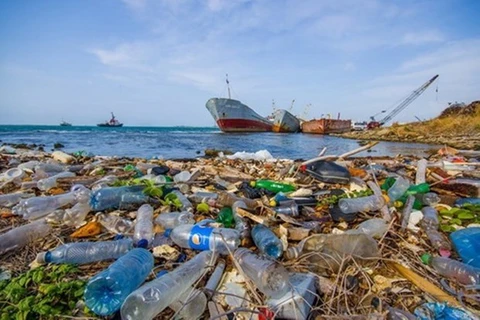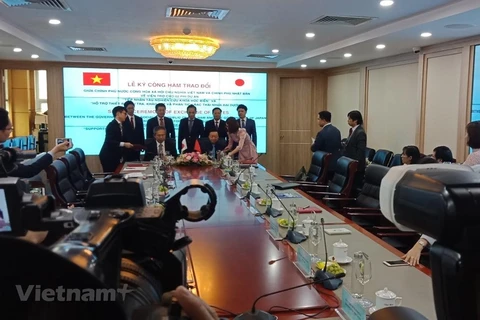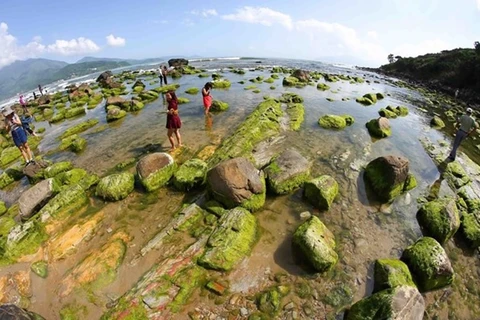 Supermarkets switch to using banana leaves in stead of plastic bags for packaging goods. (Photo: VNA).
Supermarkets switch to using banana leaves in stead of plastic bags for packaging goods. (Photo: VNA). Hanoi (VNA) - Vietnam has recorded positive results after nearly two years carrying out the “saying no to plastic waste” movement, according to vice head of the Ministry of Natural Resources and Environment (MONRE)’s Vietnam Environment Administration Nguyen Thuong Hien.
In a recent interview with Vietnamplus online newspaper of the Vietnam News Agency, Hien highlighted outstanding results since the movement was launched by the Prime Minister and the MONRE in 2019 with the aim of cutting the use of single-use plastic products.
Many supermarkets have committed themselves to ending the use of single-use plastic bags, and many organisations have started initiatives to encourage people to reduce the use of plastic.
Small actions such as exchanging plastic waste for trees, and using banana leaves and biodegradable bags to wrap foods, have contributed to changing habits and raising public awareness of protecting the environment, Hien said.
From changing “awareness” to taking strong “actions”
According to Hien, concrete and practical actions of the Government, the Prime Minister and relevant ministries, sectors, localities and people throughout the country in recent years have helped change public awareness about the significance of reducing the use of single-use plastics, and collecting, reusing, recycling and treating plastic waste.
 Small actions such as exchanging plastic waste for trees, and using banana leaves and biodegradable bags to wrap foods, have contributed to changing habits and raising public awareness of protecting the environment. (Photo: VNA)
Small actions such as exchanging plastic waste for trees, and using banana leaves and biodegradable bags to wrap foods, have contributed to changing habits and raising public awareness of protecting the environment. (Photo: VNA) Regarding policy, the National Assembly passed the Law on Environmental Protection in 2020, in which Article 73 contains requirements on minimising the amount of plastic waste, encouraging people to recycle and process plastic as well as combat ocean plastic, he said.
Previously, the MONRE also advised the Prime Minister to issue Decision No. 1746/QD-TTg dated December 4, 2019 on promulgating the National Action Plan on marine plastic waste management to 2030.
The action plan set the target to reduce marine plastic litter by 75 percent, collect 100 percent of abandoned, lost or discarded fishing material, and put an end to the disposal of fishing waste into the sea.
It also aims to have 100 percent of coastal tourism areas, tourist attractions, tourist accommodations and other seaside tourism services not use single-use plastics and non-biodegradable plastic bags, and 100 percent of marine protected areas stay free of plastic waste.
The government also directed authorities to enhance communication work on plastic waste prevention and control in 2021-2025 as well as strengthen the management, recycle, reuse, processing and reduction of plastic waste.
The MONRE has also set an example in this movement and called for its staff to take actions and encourage their families and relatives to join the movement.
It cooperated with the Ministry of Education and Training to strengthen environmental protection work in 2019-2025, aiming to raise awareness of teachers and students and disseminate information about environmental protection laws.
The Ministry of Health issued a directive in 2019 to direct hospitals and health establishments, pharmaceutical companies and stores to limit the use of single-use plastic bags, Hien said.
Big changes related to this issue have also been recorded in most localities, he added.
Highlights of achievements
According to Hien, many supermarkets in big cities and provinces have committed to ending the use of single-use plastic bags including Co.op mart Vietnam, Big C Da Nang, and Big C Hanoi. They are using leaves to wrap goods.
Several airlines also committed to paying attention to the use of environment-friendly products on their flights. Many organisations and individuals across the country have called for people to exchange plastic for plants while some food and drink establishments replaced plastic straws with those made from paper or other environmentally-friendly materials.
With the support of the MONRE, an alliance of businesses against plastic waste has been set up including major manufacturing and retail distribution companies such as TH Group, Coca-Cola, La Vie, Nestle, and Nutifood.
An agreement on building a circular economy has been signed between the ministry and companies Dow Chemical Vietnam, SCG and Unilever.
Agencies and localities, as well as international organisations and educators have joined hands in the movement and had great impacts on the community and the whole society.
With the results achieved, Vietnam will be successful in reducing plastic waste and contribute to the sustainable socio-economic development and the establishment of a circular economy, Hien stressed.
To improve the management of waste, the MONRE is reviewing and proposing to the Government several measures, he noted.
He underlined the need to have guidance documents in the implementation of the Law on Environment 2020 to reduce the impacts of waste, especially plastic waste, on the environment.
It is also important to encourage businesses and people to invest in the manufacture of and use environmentally friendly materials, enhance recycle and reuse of waste as well as build a circular economy, he added.
The ministries, agencies and localities need to push scientific research, strengthen the application and transfer of technology in the field, among many others, he said./.

























